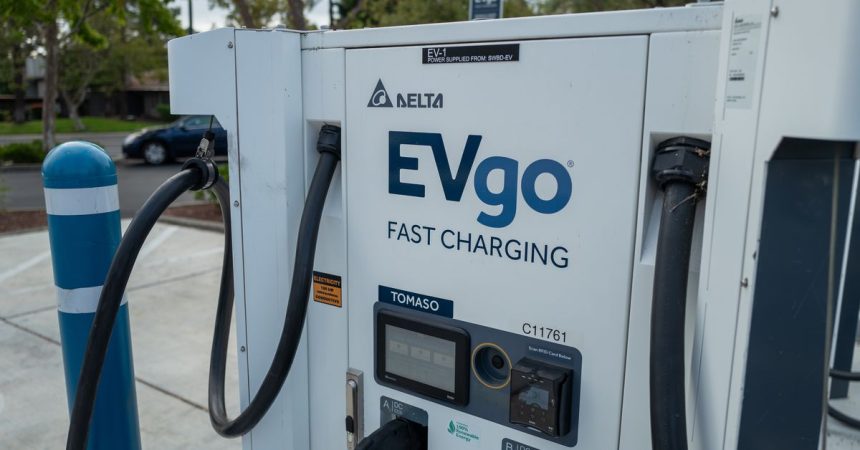The US Department of Energy’s recent $1.25 billion loan to EVgo, a prominent electric vehicle charging company, underscores the Biden administration’s accelerated efforts to solidify its electric vehicle (EV) infrastructure investments before the upcoming presidential transition. This substantial loan is earmarked for EVgo’s ambitious plan to deploy approximately 7,500 new chargers across roughly 1,100 charging stations throughout the United States within the next five years. A significant emphasis of this expansion is the installation of high-powered 350kW fast-charging stalls, capable of simultaneously charging two vehicles, further enhancing charging accessibility and convenience for EV drivers. This move is not merely about infrastructural development; it signifies a strategic maneuver by the current administration to cement its legacy in the EV sector and maximize its impact before leaving office.
The urgency surrounding these investments stems from the anticipated policy shifts under a new administration. Former President Donald Trump, who has expressed his intention to reverse or significantly curtail many of Biden’s EV-focused initiatives, poses a direct threat to the current trajectory of EV adoption in the US. Trump has specifically targeted the $7,500 federal tax credit for new EV purchases and threatened to dismantle the remaining funding allocated for EV charging infrastructure under the Inflation Reduction Act (IRA). This potential reversal of federal support creates a sense of urgency within the Biden administration to expedite the distribution of funds and lock in progress on EV projects.
With a limited time remaining in office, the Biden administration, through the Department of Energy, has been rapidly approving a series of substantial loans for EV-related projects. These include preliminary approvals of $7.54 billion for a Stellantis and Samsung battery factory in Indiana and $6.6 billion for a Rivian EV manufacturing plant in Georgia. Beyond promoting the transition to electric mobility, these investments are also strategically positioned as job creation initiatives. EVgo, for instance, projects that its expansion will generate 180 construction jobs and over 550 positions in maintenance and support.
EVgo’s collaboration with General Motors further highlights the growing momentum within the private sector to expand the national EV charging network. The two companies recently marked the installation of their 2,000th charging stall, a testament to their ongoing partnership. This private sector engagement aligns with President Biden’s initial pledge to establish 500,000 EV chargers by 2030, a goal supported by the $7.5 billion allocated for charging infrastructure expansion under the Bipartisan Infrastructure Bill. After a relatively slow start in the initial years of this initiative, recent progress indicates a significant acceleration in deployment, driven by a combination of federal and private investment.
The Department of Energy reports a substantial increase in the number of publicly available charging ports, exceeding 204,000, with almost 38,000 new public chargers added this year alone. This translates to an average of nearly 1,000 new public chargers coming online every week, a figure that reflects the combined impact of direct federal funding, tax incentives, state and local initiatives, and private investments. This expansion encompasses both Level 2 chargers, typically used for overnight charging, and DC fast chargers, which offer significantly faster charging times, catering to a wider range of charging needs.
The rapid growth in charging infrastructure represents a significant advancement compared to the beginning of 2021, when President Biden first took office. The number of charging ports has effectively doubled within this period, demonstrating tangible progress towards the ambitious 2030 goal. This accelerated development not only addresses the growing demand for charging access as EV adoption increases, but also sends a strong signal to the market about the long-term commitment to electrifying transportation, despite potential future policy changes. The current administration is effectively racing against the clock to solidify a foundation for widespread EV adoption, leaving a lasting impact on the transportation landscape.



